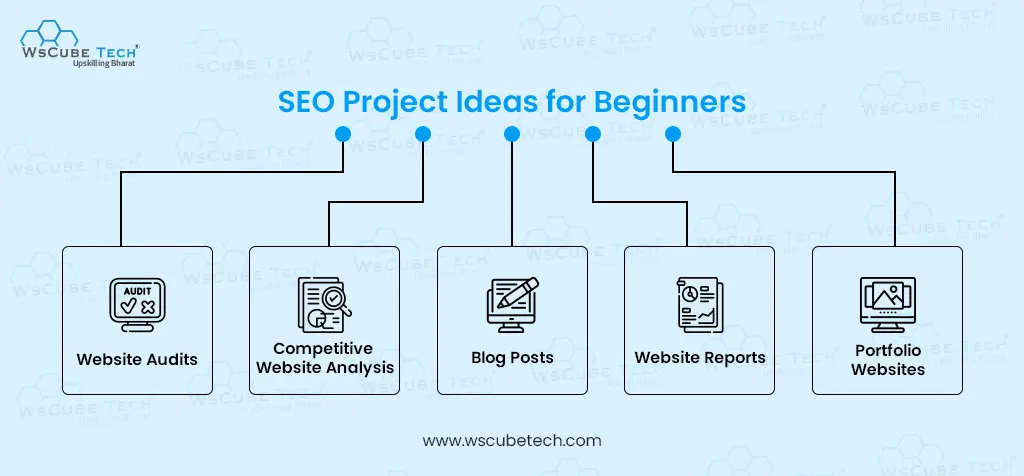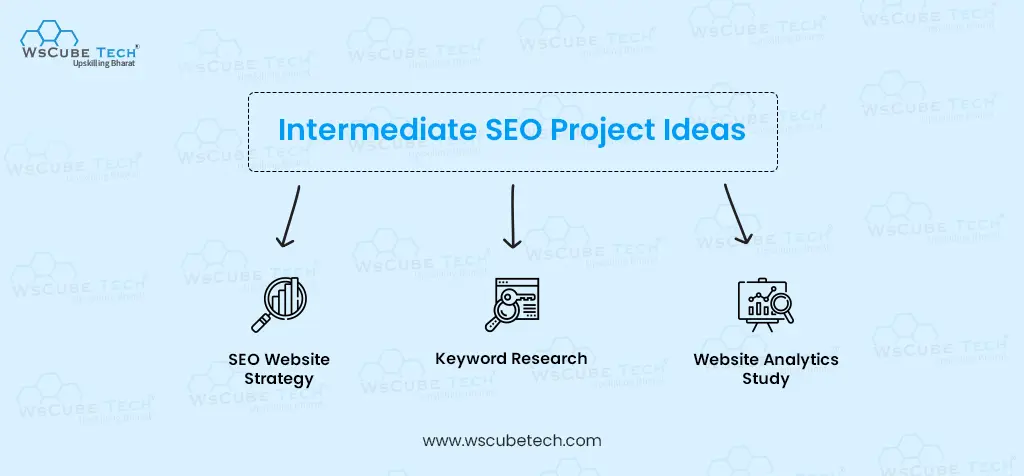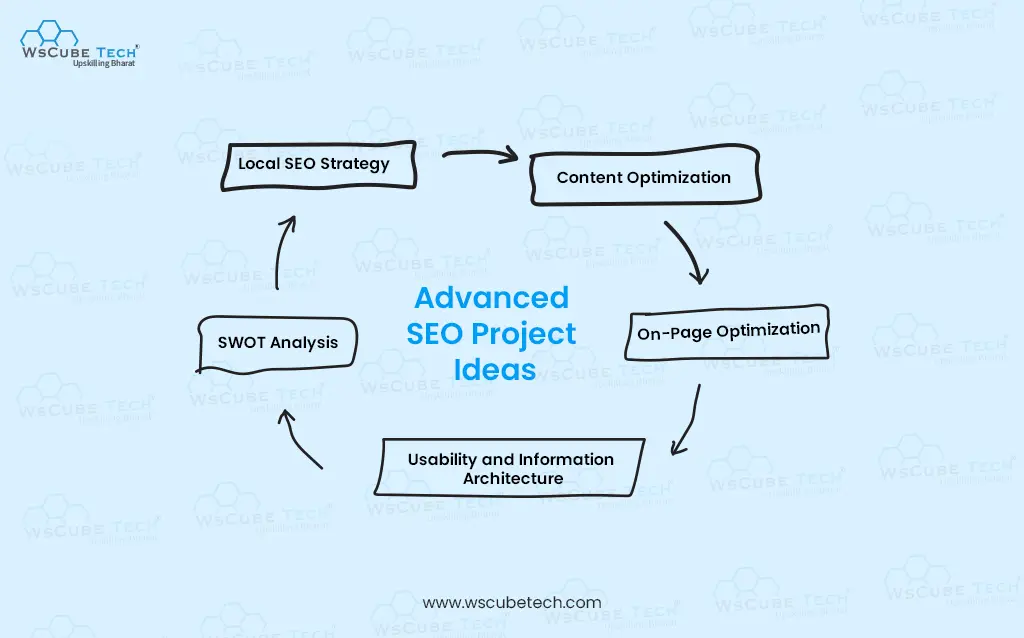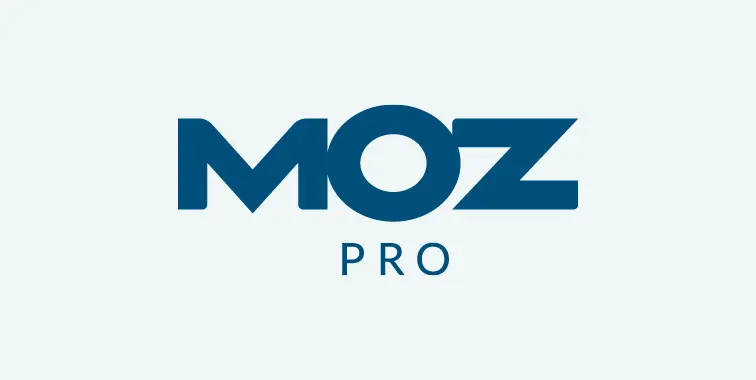Today, businesses must have a robust SEO strategy to attract organic traffic and boost their online presence. As a professional in the field, engaging in SEO projects is a great opportunity to showcase your knowledge and expertise.
These projects enable you to apply your skills to real-world scenarios, demonstrating your ability to drive traffic, improve rankings, and boost overall website performance. This blog explores various SEO project ideas to help you enhance your skills and advance your career.

What are SEO Projects?
SEO projects encompass several strategies and processes that boost a site’s visibility in organic search results, attracting visitors and potentially upsurging online revenue. As part of the broader field of Search Engine Marketing (SEM), these SEO project examples focus on optimizing a site’s ranking to make it more visible to users looking for products/ services via search engines.
Upskill Yourself With Live Training (Book Free Class)
Best SEO Projects
Some SEO projects for practice exist to showcase your skills in your portfolio; however, you must know which is best based on your skill level. Enhance your skills with SEO courses that provide a strong foundation for success in the ever-evolving digital landscape.
The below section demonstrates a few helpful SEO project examples:
SEO Project Ideas for Beginners

1. Website Audits
- SEO Skills: Analytics, Website Optimization
Evaluating a site’s online presence discloses its weaknesses in SEO strategy and how these affect its traffic and performance. This project adds weight to your portfolio as it is one of the most vital aspects of website optimization.
2. Competitive Website Analysis
- SEO Skills: Analytics, Website Optimization
Another perfect way to showcase your skills is by comparing two websites’ SEO strategies. To start working on this project, pick up a website from an industry that interests you and research its competitors’ SEO strategies. The information from this competitive analysis can later be used to decide how to outrank them.
3. Blog Posts
- SEO Skills: Writing, Copywriting, Editing, Link building
This is an ideal SEO project for beginners. You can exemplify your ability to use keywords and help refine a website’s online presence. Using keywords in a blog is necessary as it makes a website visible to a massive audience. Working on this project improves your SEO skills and introduces you to deeper SEO aspects.
4. Website Reports
- SEO Skills: Reports, Writing, Editing
This SEO project for beginners entails creating and evaluating analytical reports for a website to analyze its SEO health and determine its rank. Every SEO professional must be familiar with this task, which would be ideal for your portfolio.
5. Portfolio Websites
- SEO Skills: Writing, Editing, Content Marketing, Copywriting, Programming skills
A portfolio website demonstrates your skills by including projects you have worked on, clients’ testimonials, and even information about your professional life. You should have a keyword-rich blog on the website to reach a broader target audience, which helps you stand out.
Also Read: What Are Meta Tags in SEO? All Meta Tags Explained
Intermediate SEO Project Ideas

The SEO projects you add to your portfolio as an intermediate-skill level SEO specialist must show that you are skilled and experienced. The following are some SEO project ideas to showcase to employers to achieve your goal of advancing your career path.
1. SEO Website Strategy
- SEO Skills: Website Optimization, Content Marketing
This project requires experience in SEO strategies to assist a business in establishing a foundation for its upcoming projects. You will enhance the visibility of a website’s SERP (search engine results pages) by optimizing its content by topic, which will help you improve search engine traffic.
2. Keyword Research
- SEO Skills: Research, Content Marketing, Copywriting
Keyword research allows you to find the keywords to use on your website to make it rank higher. It is one of the most crucial aspects of SEO to enhance website traffic with keywords that users search for and display the answer precisely when searching for it. This is one of the best ways to show your SEO skills. You can master this skill by enrolling in an SEO course.
3. Website Analytics Study
- SEO Skills: Analysis, Research, Optimization
A website analytics study lets you monitor your competitors and increase traffic with minimal effort. It encompasses identifying measures based on your company’s and users’ objectives and analyzing data from your website to assess whether they were met. It can also help you develop a strategy to improve user experience.
Advanced SEO Project Ideas

As an advanced-level professional, your projects must portray your abilities and show clients that you are highly skilled and experienced and can deliver splendid work. Your portfolio should be comprised of technical SEO projects that demonstrate your mastery.
Below is a list of SEO projects you can work on to develop advanced skills:
1. Content Optimization
- SEO Skills: Content Marketing, Writing, Editing, Copywriting, Link building
Content optimization makes a website enticing to search engines and users. It involves keywords, content quality, relevant links, meta tags, and title tags. Content optimization makes it effortless for the search engine to find and index the site and rank it in SERPs. With content optimization, your site can also reach more Internet users.
2. On-Page Optimization
- SEO Skills: Research, Writing, Link Building, Copywriting, Editing
On-page optimization refers to the measures you take to enhance a website’s ranking on search engines with actions such as keyword placement, keyword density, meta descriptions, title tags, and user experience. An SEO project on this topic demonstrates to the hiring team that you have the skills to boost your website’s ranking in search engines.
3. Local SEO Strategy
- SEO Skills: Content Marketing, Link building, Research, Analysis
This strategy helps a website rank on local search engine results. This means the website will be more visible to users in the company’s vicinity and ensures that your website reaches people who need and use your services. A local SEO strategy is suitable for service providers who want local clients. Use this project to land a job with a regional company that focuses on offering services in a specific location.
4. SWOT Analysis
- SEO Skills: Research, Analysis
A business identifies its SWOT (strengths, weaknesses, opportunities, and threats) by evaluating its website’s current and future growth. A SWOT analysis enables you to develop plans to upgrade a website, stay ahead of the competition, and stand out. A project on this shows potential employers you have the skills required to grow their website.
5. Usability and Information Architecture
- SEO Skills: Research, Analysis, Content Marketing, Copywriting
Information architecture is an essential aspect of SEO. It involves the arrangement of content on your site and includes how folders are designed, arranged, and labeled. Website traffic increases or decreases based on how appealing it is to users. If a website’s content is valuable, it increases its conversion rate to maintain usability and information architecture. Showcasing these skills to a prospective client helps you stand out.
Interview Questions for You to Prepare for Jobs
| Digital Marketing Interview Questions | SEO Interview Questions |
| Email Marketing Interview Questions | Content Writing Interview Questions |
Also Read: What Are LSI Keywords in SEO? Examples, Benefits, Use
Essential Tools Required For SEO Projects
The following are the essential tools for successfully managing SEO projects online and optimizing websites:
1. SEMrush

SEMrush, a versatile SEO tool, is your key to unlocking your website’s potential. It assists digital marketers with keyword research, competitive analysis, SEO audits, backlink opportunities, and landing page optimization. It tracks website traffic sources, whether organic or paid and offers a free trial, making it accessible to a broad audience. SEMrush aids in discovering new keywords, improving content, and learning effective content marketing strategies, paving the way for significant improvements in your website’s SEO performance.

2. Google Search Console

Google Search Console is a free, indispensable SEO tool for understanding and improving website performance in search engine results pages (SERPs). It offers insights into site performance, optimization of page titles and meta descriptions, setting up redirects, and more. Google Search Console provides data on a website’s backlinks, content opportunities, and top-performing keywords. It’s a must-have for digital marketers, ensuring content remains up-to-date and optimized for search engines.
3. Majestic

Majestic simplifies the process of evaluating website backlinks and referrals. Its site explorer tool allows in-depth domain and URL analysis. Further, the backlink history checker audits backlinks detected by Majestic’s web robots and compares a website’s backlink history with competitors. This tool offers valuable data and insights for understanding a website’s link profile.
4. GTmetrix

GTmetrix, an all-in-one tool, is designed to make website performance analysis and optimization a breeze. It’s about assessing loading speed and offering insights from various global locations through its 28 servers spanning 7 regions. With detailed information on loading times and request handling, it can trigger alerts based on specific conditions. Plus, it visualizes page loading, making it easier to identify and resolve performance issues.
Also Read: Full On-Page SEO Checklist 2025 (With Strategy)
5. Moz Pro

Moz Pro, a comprehensive SEO tool, is a one-stop solution for all your SEO needs. With its user-friendly interface, it offers analytics and insights to enhance search engine rankings. Their popular Chrome extension, Mozbar, conveniently displays Domain Authority and Page Authority directly in the browser, simplifying competitor analysis. This tool covers a broad spectrum of SEO tasks, such as ranking checks, rank tracking, site crawling for issue discovery, on-page SEO optimization, and link profile analysis, ensuring that you have everything you need for effective SEO management.
6. SpyFu

SpyFu tool uncovers competitor insights. Entering a domain name reveals competitor keywords and ad variations. It provides recommendations to boost web traffic, supports partnership building, monitors AdWords bidding, and offers historical ranking data for specific keywords.
7. Crazy Egg

Crazy Egg is a renowned tool for click-tracking and heatmap generation, offering a unique approach to SEO analysis. Embedding a small code allows tracking visitor behavior on web pages. It provides insights into who’s clicking, what they’re avoiding, reasons for site abandonment, and the most effective parts of web pages for conversions. Crazy Egg generates heat maps to visualize user interactions.
8. Copyscape

Copyscape is essential for detecting and addressing duplicate content issues negatively impacting a website’s credibility and SEO rankings. Duplicate content leads to penalties from search engines. Copyscape scans and monitors web pages to identify plagiarized content and can send alerts when content is copied or used elsewhere. Its sister site, Siteliner, identifies duplicate content within a website and checks for broken links and other issues.
9. Pro Rank Tracker

Pro Rank Tracker is a cloud-based solution for tracking keyword rankings and generating reports. It identifies the keywords a website currently ranks for and suggests new ones to target. Moreover, it suits businesses of all sizes and delivers accurate ranking information through advanced algorithms. This tool automatically tracks web page ranks and allows video rankings to be tracked on platforms like YouTube.
Skills Required for SEO Projects to Help You Practice
Some skills are necessary to excel as an SEO specialist. Your proficiency in SEO task management demonstrates to an employer that you are well-equipped and able to work efficiently to improve a company’s business, develop a content strategy, and grow its website.
1. Search Engine Algorithms and Ranking Factors
Proficiency in search engine algorithms and ranking factors is an imperative requirement for an SEO expert. Being the core of SEO, all SEO newbies begin their journey from here. After all, they make their living by optimizing websites to rank higher in search results.
2. Keyword Research
Keyword research is not just about identifying terms; it’s about understanding your audience’s needs and desires. This powerful SEO skill empowers you to choose the right keywords, saving time and producing content your audience craves reading.
3. Data Analysis
As SEO professionals, our ultimate goal is to connect with our customers. That’s why our data skills are so crucial. We don’t just review an SEO campaign’s performance; we compare it with past campaigns to understand what truly resonates with our customers. This customer-centric approach allows us to adjust or improve our strategies, ensuring that our SEO campaigns always hit the mark.
4. Content Marketing
Content marketers are associated with content creation and distribution. They focus on producing high-quality content that adds value to a company’s website and social media. You must create a thorough list of topics and decide what content is valuable to the company.
5. Copywriting and Editing
This skill is essential for every SEO manager. You must create a potent SEO strategy, communicate with your clients or customers, and convert their visits to your site.
6. Link-building Skills
Website content needs external and internal links. These links help increase your website’s quality and generate traffic that may lead to conversions. This practice involves attracting inbound links from other sources to your website.
7. Programming Skills
As an SEO professional, skills in workflow tools and programming languages such as CSS (Cascading Style Sheets) and HTML (Hypertext Markup Language) help you stand out. The potential to code, format, and add text on a website enables you to land your next job.

Also Read: Major Functions of Search Engine (How Search Engines Work)
FAQs on SEO Project Ideas and Topics
SEO projects encircle numerous processes and strategies in order to upsurge a website’s visibility in organic search results. This aids in attracting more visitors, thereby increasing online revenue.
Students can engage in various projects, such as developing analytical reports on websites, creating SEO strategies, conducting website audits, building blogs from scratch, and doing competitive analysis.
Engaging in such projects allows working professionals to deepen their understanding of SEO topics and stay updated with industry trends. It also provides an opportunity to showcase their knowledge and expertise.
Follow the below steps to start your first SEO project in 2025:
1. Prepare keywords list
2. Analyze Google’s first page
3. Pinpoint your competitors
4. Add a Hook
5. Optimize for on-page SEO
6. Optimize for search intent
7. Concentrate on content design
8. Build links to your page
9. Upsurge and update your content
You can manage SEO projects independently. However, to reap significant benefits like increased visibility and traffic, you must strive for the long term. Start with one aspect of the process, then progress gradually towards SEO success when prepared.
Conclusion
Engaging in SEO projects is a great way to showcase your skills and expertise in the field. You can enhance your knowledge and stand out by developing reports, creating SEO strategies, conducting website audits, building blogs, creating portfolio websites, and performing competitive analysis. Choose projects that align with your expertise, seek guidance from mentors, or enroll in an online SEO course for structured learning.
Read more blogs:



